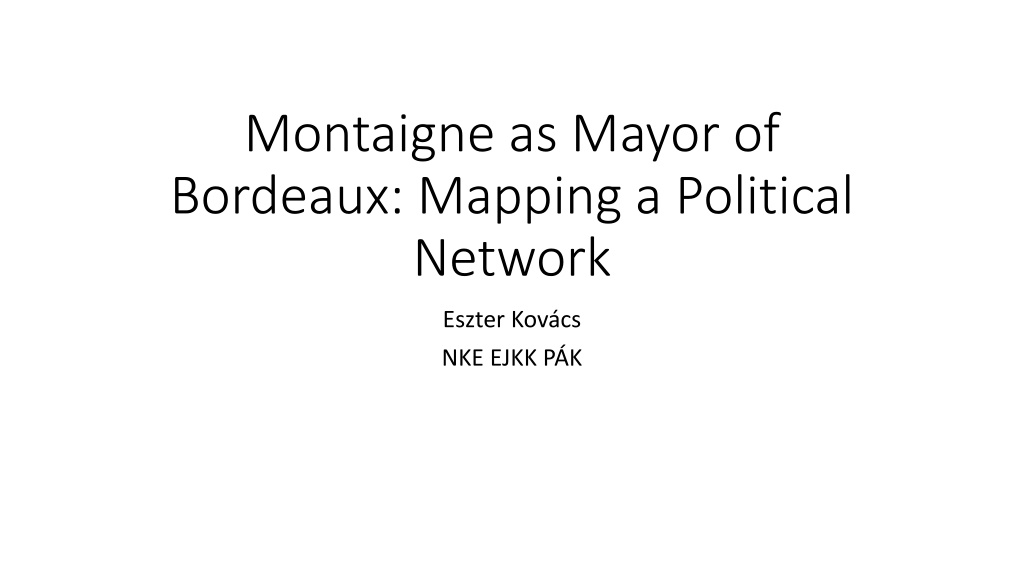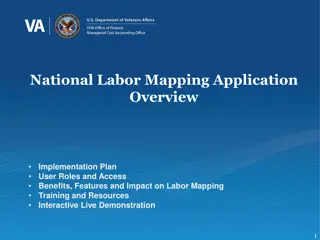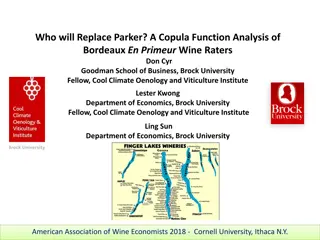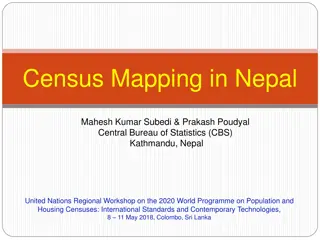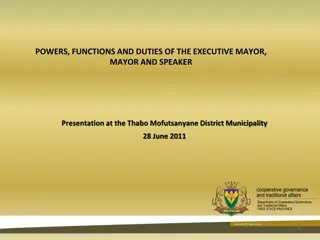Montaigne as Mayor of Bordeaux: Political Network Mapping
Montaigne, known for his diverse career, served as Mayor of Bordeaux from 1583 to 1585. He maintained a clear separation between his roles and focused on local self-government and tradition. This period was marked by his negotiation skills between Henri III and Henri de Navarre, showcasing his diplomatic abilities. The narrative reflects on the evolution of governance and individual ambitions within a small community setting.
Download Presentation

Please find below an Image/Link to download the presentation.
The content on the website is provided AS IS for your information and personal use only. It may not be sold, licensed, or shared on other websites without obtaining consent from the author. Download presentation by click this link. If you encounter any issues during the download, it is possible that the publisher has removed the file from their server.
E N D
Presentation Transcript
Montaigne as Mayor of Bordeaux: Mapping a Political Network Eszter Kov cs NKE EJKK P K
Montaignes career Member of the Parlement de Bordeaux until 1570: legal career 1570-1580: Ch teau de Montaigne 1580-1581: travel to Italy, cure or diplomatic ambition? 1581-1583, 1583-1585: Mayor of Bordeaux, succeeded by Matignon After 1585: negotiator between Henri III and Henri de Navarre
Of husbanding our will (Essays, III, 10) Le maire et Montaigne ont toujours t deux, d une s paration bien claire. The mayor and Montaigne have always been two, with a very clear separation. (trans. by Donald Frame) Si quelquefois on m a pouss au maniement d affaires estrangieres, j ay promis de les prendre en main, non pas au poulmon et au foye ; de m en charger, non de les incorporer ; de m en soigner ouy, de m en passionner nullement : j y regarde, mais je ne les couve point. If people have sometimes pushed me into the management of other men s affairs, I have promised to take them in hand, not in lungs and liver; to take them on my shoulders, not incorporate them into me; to be concerned over them, yes; to be impassioned over them, never. I look to them, but I do not brood over them. (trans. by Frame) If I have sometimes been persuaded to involve myself in the affairs of others, I have promised to take them in hand, not into the lungs and stomach; to shoulder them, not to ingest them; to pay attention to them, yes; to take a passionate interest in them, never. I keep an eye on them, but I do not coddle them. (trans. proposed by Philip Stewart)
Local self-government, custom and tradition lived a life apart, with their own fashions, dress and habits, ruled and governed by certain particular systems and customs, handed down from father to son, to which they bound themselves with no other constraint than that of reverence for their practice. This little state had continued from all antiquity in so happy a condition that no neighboring judge had been put to the trouble of inquiring into their doings, no lawyer retained to give them counsel, no foreigner ever called in to settle their quarrels; and no one of this district had ever been seen begging. They avoided marriages and dealings with the outer world, so as not to corrupt the purity of their government, until, so they tell, one of them, within the memory of their fathers, whose soul was spurred by noble ambition, took it into his head, in order to bring his name into credit and reputation, to make one of his sons Ma tre Jean or Ma tre Pierre, and having sent him to some neighboring town to learn how to write, finally made him into a fine village notary. This son, having become important, began to disdain their ancient customs and to put into their heads the notion of the pomp of the regions on this side of the mountains. The first of his cronies whose goat had a horn broken off he advised to demand justice from the royal judges near by; and he went on from this one to another until he had debased to whole place. (tale of Lahontan, II, 37, trans. by Donald Frame)
Messieurs de Bordeaux m esleurent maire de leur ville
End of the mandate Conflicts in Guyenne, plague in Bordeaux Next mayor: Matignon Some say about this municipal service of mine [ ] that I went about it like a man who exerts himself too weakly and with a languishing zeal; and they are not at all far from having the case. [ ] People also say that my administration passed without a mark or a trace. That s a good one! They accuse me of inactivity in a time when almost everyone was convicted of doing too much. (III, 10, trans. by Frame) I would spare neither life nor any other thing for your service; but I will leave you to judge of what use my presence would be at the approaching election before venturing to come into the city, considering the bad state in which it is, especially dangerous to people who come from such good air as I do. (Letter to the jurats, 1585, trans. by Charles Cotton)
Debates about Montaignes role as mayor Katherine Almquist (1968 2012): need to write a pluralist biography Jean Starobinski: aptitude to political negotiation and not political struggle Philippe Desan: Montaigne s unfulfilled ambitions Anne-Marie Cocula: Montaigne, a key figure in Guyenne Biancamaria Fontana: low-key performance as mayor, not a proof for Montaigne s so-called political conservativism
Network research? Local network vs. extended network How to structure data on people? origin, religion, group, alliance? How to exploit datasets? Biographical studies (causality) vs. network (patterns) Is quantification possible? Katherine Almquist tried to quantify Montaigne s legal activity in the Bordeaux Parliament Interrelation vs. quantification
Network research first phase Creation of a namespace of Montaigne s local network and of his higher network Tool proposed: Opentheso (free, development, using persistent identifiers, used by several French projects in humanities) opensource, under further
Thank you for your attention. Montaigne, ph m rides, 21stFebruary 1583 nous e mes encore une fille qui fut nomm e Marie [ ] Elle mourut peu de jours apr s
